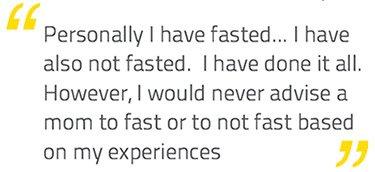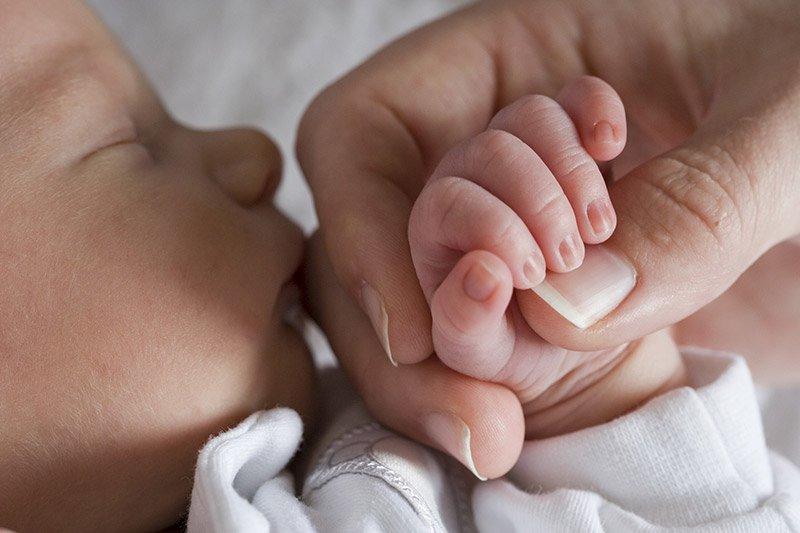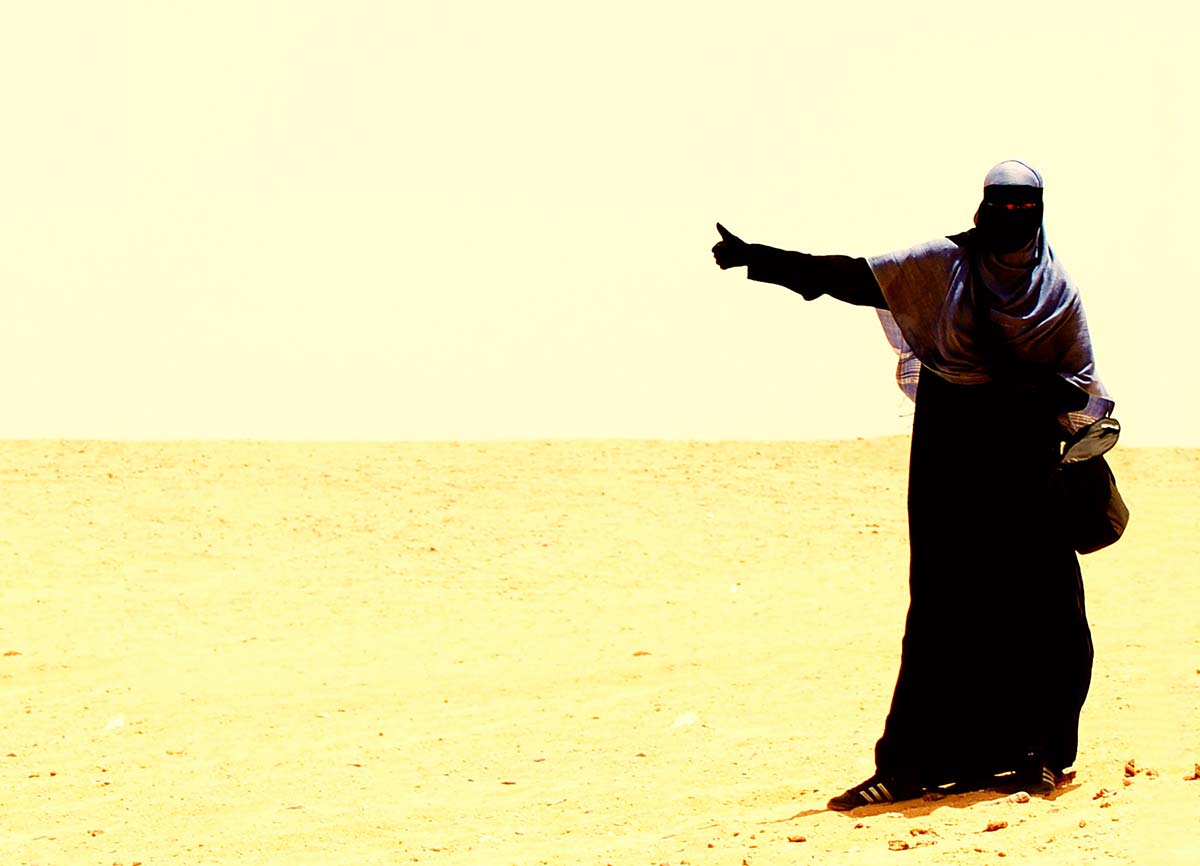IT’S that time of year again, Ramadan, Alhamdulillah.
Fasting during Ramadan is obligatory upon all able-bodied adults. There are, however, a few exceptions. Allah, The Most High says :
“And whosoever is sick or is upon a journey; then the period is made up from other days…” [Soorah Al-Baqarah: 185]
Women who are pregnant or breastfeeding are included here and may opt not to fast. Every year I get phone calls, emails, or in person requests for information about fasting while pregnant or breastfeeding a baby. Pregnant mothers are always wondering if fasting will be harmful for them or their baby. “Will I have enough energy?” “Will my labor start early?” “Will I or my baby lose weight? Or will we get sick?” Breastfeeding mothers wonder, “Will I have enough milk for my baby?” “Will my health be affected?” They wonder how they can be sure to take care of their babies and themselves. They ask all sorts of questions because, let’s face it: Moms tend to worry!
One thing is for certain, each woman, in fact each pregnancy or nursing experience, is different. It is important for each mom to weigh her current situation individually. Sometimes a mom will feel pressure from a loved one or friend. Her auntie might say, “I fasted the entire month of Ramadan while pregnant. Three times. Why can’t you do it?” A friend might advise, “When I was breastfeeding my son, I was scared I would lose all my milk. So I didn’t fast the entire month.”
Personally I have fasted while pregnant, while breastfeeding, and while breastfeeding during a pregnancy. I have also not fasted at those times. I have done it all. However, I would never advise a mom to fast or to not fast based on my experiences. All I can do is to give her the needed information, support her in her decision, and trust that she knows how her body feels and what her baby needs.
A pregnant mom may have less energy and often feels fatigued. She may be dealing with morning sickness or any of the other numerous side effects of pregnancy. She must first decide if any of these symptoms will make fasting difficult for her. A mom who suffers from nausea may find that eating small meals, fairly often settles her stomach. In her case, she may not fast for fear of being sick for a whole day. If a mom has trouble gaining weight during her pregnancy, she might find fasting to exacerbate her problem. These moms would have to think twice about fasting. If you are in doubt as to whether or not you are able to fast, consult a doctor. [Also read: When You Can’t Fast: Women In Ramadan]
Fortunately, some mothers are able to escape these pregnancy related ailments (either because of where she is in her pregnancy, or because she simply isn’t troubled by these things). These women might choose to fast. If this is your case, go ahead and try to fast for a day. If you are able to get through the day easily, wonderful; if not, it might be best to break your fast. Some mothers find they are able to fast one day, but not the next. So, she might choose to fast, then skip a day, then fast, then skip a day again. One year when I was eight months pregnant, I discovered that I could fast for three days in a row. If I tried a fourth day, I felt weak and was miserable. So I fasted three days on, one day off for the whole month. Some women may fast for two days on one day off. Any number of combinations of fasting and skipping days may work for a pregnant woman. The key is for her to discover what works for her at the time.
 After the blessed event of birth, a woman is not yet done nourishing her baby. When nine months of gestation end, months (or years) of breastfeeding begin. Breastfeeding moms are concerned about their baby’s health and their milk supply. Mothers often ask, “Should I fast while I am nursing my baby?” Well, that is a hard question to answer. Remember, every woman’s body is different. Each nursing baby is also different. In other words, a mom who is breastfeeding a second or subsequent baby may very well have a different experience from a previous breastfeeding baby. A mom may have had no problems fasting while nursing before, and still have concerns about fasting while breastfeeding a current baby.
After the blessed event of birth, a woman is not yet done nourishing her baby. When nine months of gestation end, months (or years) of breastfeeding begin. Breastfeeding moms are concerned about their baby’s health and their milk supply. Mothers often ask, “Should I fast while I am nursing my baby?” Well, that is a hard question to answer. Remember, every woman’s body is different. Each nursing baby is also different. In other words, a mom who is breastfeeding a second or subsequent baby may very well have a different experience from a previous breastfeeding baby. A mom may have had no problems fasting while nursing before, and still have concerns about fasting while breastfeeding a current baby.
A breastfeeding mother’s concern is her baby’s health. Will he get enough milk? Will Mother’s supply decrease? It is important to be aware of any changes in your Baby. If he seems hungrier, fussier, more irritable, than normal and there is no other cause, consider that your supply has been affected. Observing Baby’s output is an easy way to check if he is getting enough milk. What goes in, must come out. Have you noticed a change in Baby’s diapers? Does Baby have the same elimination pattern that was established before fasting began? Be aware of changes in wet (urine) or soiled (bowel movement) diapers. If Mom does believe Baby is not getting enough milk, she can check Baby’s weight for confirmation.
Studies have shown that complete fasting during the daylight hours (the fast of Ramadan) does not affect Mom’s milk supply. However, there is a concern about Mom becoming dehydrated. If she becomes dehydrated, her supply might decrease. Additionally she may not feel well. Symptoms of dehydration include: feeling very thirsty, passing dark-colored and strong-smelling urine, feeling weak or faint, or developing a headache or other pain. If any of these symptoms are experienced, Mom should take note and rethink her decision to fast. It is especially difficult during these hot summer months when days are long. [Also read: Time Management In Ramadan]
In both cases (pregnancy and breastfeeding), if a woman chooses to fast, she should pay attention to what she eats and drinks during the evening hours. Be sure to drink, drink, drink. Water is the best drink. Fruit or vegetable juices are also good. Sugary and/or caffeinated drinks should be limited.
One solution for fasting moms who are pregnant or nursing is to eat a meal in addition to suhoor and iftar. (A fasting mom should be sure not to skip suhoor.) Some women will eat a late dinner, hoping to replace what she missed out on during the day. Mom should concern herself with eating well-balanced meals when fasting. Include plenty of fruits and vegetables in your diet. For the pre-dawn meal, Mom should eat a filling meal. High fiber and complex carbohydrates are more filling. Limit your sweets and opt for fresh fruit instead. [Also read: 5 Things Muslim Women Should Never Do In Ramadan]
Pregnant and breastfeeding moms should be sure to get plenty of rest. Taking a nap in the afternoon is a great way to recharge Mom’s batteries. Errands, housework, anything that might zap your energy should be done earlier in the day when you have more energy. Toward the end of the day, it may help to relax, or do easier activities only. Even on normal days, people tend to feel tired, irritable, or hungry at the end of the day. This is even more true when a pregnant or breastfeeding mom is fasting.
All in all, a pregnant or breastfeeding mom can safely fast if she is up to it. She should feel no pressure from anyone in either case. She must decide if she is able to fast. If you make the decision to fast, get enough rest, limit your afternoon activities, be sure to eat and drink well, and observe your baby for problems. Keeping these tips in mind, fasting during Ramadan while pregnant or breastfeeding can safely be accomplished.
Limited free articles. Subscribe for full access.








 Dr. Bilal Philips
Dr. Bilal Philips